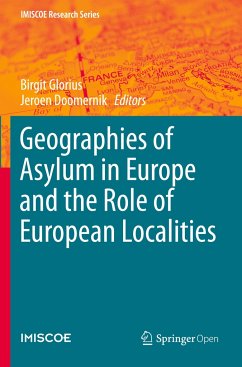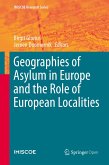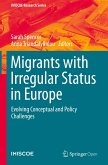Geographies of Asylum in Europe and the Role of European Localities
Herausgegeben:Glorius, Birgit; Doomernik, Jeroen
Geographies of Asylum in Europe and the Role of European Localities
Herausgegeben:Glorius, Birgit; Doomernik, Jeroen
- Broschiertes Buch
- Merkliste
- Auf die Merkliste
- Bewerten Bewerten
- Teilen
- Produkt teilen
- Produkterinnerung
- Produkterinnerung
This open access book describes how the numerous arrivals of asylum seekers since 2015 shaped reception and integration processes in Europe. It addresses the structuration of asylum and reception systems, and spaces and places of reception on European, national, regional and local level. It also analyses perceptions and discourses on asylum and refugees, their evolvement and the consequences for policy development. Furthermore, it examines practices and policy developments in the field of refugee reception and integration. The volume shows and explains a variety of refugee reception and…mehr
Andere Kunden interessierten sich auch für
![Geographies of Asylum in Europe and the Role of European Localities Geographies of Asylum in Europe and the Role of European Localities]() Geographies of Asylum in Europe and the Role of European Localities39,99 €
Geographies of Asylum in Europe and the Role of European Localities39,99 €![Migrants and Expats: The Swiss Migration and Mobility Nexus Migrants and Expats: The Swiss Migration and Mobility Nexus]() Migrants and Expats: The Swiss Migration and Mobility Nexus39,99 €
Migrants and Expats: The Swiss Migration and Mobility Nexus39,99 €![Migrants, Refugees and Asylum Seekers' Integration in European Labour Markets Migrants, Refugees and Asylum Seekers' Integration in European Labour Markets]() Migrants, Refugees and Asylum Seekers' Integration in European Labour Markets31,99 €
Migrants, Refugees and Asylum Seekers' Integration in European Labour Markets31,99 €![Immigrant and Asylum Seekers Labour Market Integration upon Arrival: NowHereLand Immigrant and Asylum Seekers Labour Market Integration upon Arrival: NowHereLand]() Immigrant and Asylum Seekers Labour Market Integration upon Arrival: NowHereLand39,99 €
Immigrant and Asylum Seekers Labour Market Integration upon Arrival: NowHereLand39,99 €![Immigrant and Asylum Seekers Labour Market Integration upon Arrival: NowHereLand Immigrant and Asylum Seekers Labour Market Integration upon Arrival: NowHereLand]() Immigrant and Asylum Seekers Labour Market Integration upon Arrival: NowHereLand31,99 €
Immigrant and Asylum Seekers Labour Market Integration upon Arrival: NowHereLand31,99 €![Migrants with Irregular Status in Europe Migrants with Irregular Status in Europe]() Migrants with Irregular Status in Europe39,99 €
Migrants with Irregular Status in Europe39,99 €![Migrants, Refugees and Asylum Seekers' Integration in European Labour Markets Migrants, Refugees and Asylum Seekers' Integration in European Labour Markets]() Migrants, Refugees and Asylum Seekers' Integration in European Labour Markets39,99 €
Migrants, Refugees and Asylum Seekers' Integration in European Labour Markets39,99 €-
-
-
This open access book describes how the numerous arrivals of asylum seekers since 2015 shaped reception and integration processes in Europe. It addresses the structuration of asylum and reception systems, and spaces and places of reception on European, national, regional and local level. It also analyses perceptions and discourses on asylum and refugees, their evolvement and the consequences for policy development. Furthermore, it examines practices and policy developments in the field of refugee reception and integration. The volume shows and explains a variety of refugee reception and integration strategies and practices as specific outcome of multilevel governance processes in Europe. By addressing and contextualizing those multiple experiences of asylum seeker reception, the book is a valuable contribution to the literature on migration and integration, societal development and political culture in Europe.
Produktdetails
- Produktdetails
- IMISCOE Research Series
- Verlag: IMISCOE / Springer / Springer International Publishing / Springer, Berlin
- Artikelnr. des Verlages: 978-3-030-25668-5
- 1st edition 2020
- Seitenzahl: 280
- Erscheinungstermin: 11. September 2020
- Englisch
- Abmessung: 235mm x 155mm x 16mm
- Gewicht: 429g
- ISBN-13: 9783030256685
- ISBN-10: 3030256685
- Artikelnr.: 60150689
- Herstellerkennzeichnung Die Herstellerinformationen sind derzeit nicht verfügbar.
- IMISCOE Research Series
- Verlag: IMISCOE / Springer / Springer International Publishing / Springer, Berlin
- Artikelnr. des Verlages: 978-3-030-25668-5
- 1st edition 2020
- Seitenzahl: 280
- Erscheinungstermin: 11. September 2020
- Englisch
- Abmessung: 235mm x 155mm x 16mm
- Gewicht: 429g
- ISBN-13: 9783030256685
- ISBN-10: 3030256685
- Artikelnr.: 60150689
- Herstellerkennzeichnung Die Herstellerinformationen sind derzeit nicht verfügbar.
Jun.Prof. Dr. Birgit Glorius works as associate professor for Human Geography of East Central Europe at Chemnitz University of Technology. She was trained in Geography, Geology and Political Sciences at the universities of Erlangen-Nürnberg, Würzburg and the University of Texas at Austin. She earned a diploma in Human Geography from the University of Würzburg and a doctoral degree from the University of Halle-Wittenberg. Her research interests and majority of publications are in the fields of international migration, demographic change and geographies of education; most of her research is carried out in Eastern Germany, Poland, Bulgaria and the Western Balkans. Recent research projects include refugee reception in Europe, concentrating on questions of local governance and local reception cultures; effects of the European financial and economic crisis on migratory processes from southern European countries; and return migration of international students from studies abroad and mechanisms of knowledge transfer. Birgit is frequently asked to give expertise to federal and non-governmental institutions and receives invitations for academic keynotes on issues related to migration, integration and social cohesion in Europe. Migration and its consequences has always been at the centre of Jeroen Doomernik's research interests; when he studied cultural anthropology (MA in 1986), did a PhD in human geography (1986-1991), was a post-doc at the Free University in Berlin (1992-1995), worked as senior policy maker at the Dutch Ministry of the Interior (2000), was a fellow at the Transatlantic Academy in Washington D.C. (2008/2009), and presently as researcher with the Institute for Migration and Ethnic Studies (IMES) (1995 - present) and lecturer (2000 - present) at the Department of Political Science.
1 Introduction: Birgit Glorius, Jeroen Doomernik.- Part I: Governing Asylum and Reception within an Asylum System under Stress: 2 Dispersal and Reception in Northern Italy: Comparing Systems along the Brenner Route: Michela Semprebon, Gracy Pelacani.- 3 Legal Paradigm Shifts and their Impacts on the Socio-Spatial Exclusion of Asylum Seekers in Denmark: René Kreichauf.- 4 Places and Spaces of the Others: A German Reception Center in Public Discourse and Individual Perception: Daniel Göler.- 5 Before and After the Reception Crisis of 2015: Asylum and Reception Policies in Austria: Sandra Müller, Sieglinde Rosenberger.- Part II: Perceptions and Discourses on Refugee Reception6 Local Narrative-Making on Refugees: how the Interaction between Journalists and Policy Networks shapes the Media Frames: Andrea Pogliano, Irene Ponzo.- 7 Shaping "the Deserving Refugee": Insights from a Local Reception Programme in Flanders: Stiene Ravn, Rilke Mahieu, Milena Belloni, Chris Timmerman.- 8 The Public Perception of the Migration Crisis from the Hungarian Point of View. Evidence from the Field: Bori Simonovits.- Part III: Local Practices of Refugee Integration: 9 Diverging Perspectives on "Integration" in the Vocational Education System: Evidence from an East German Periphery: Birgit Glorius, Anne-Christin Schondelmayer.- 10 Municipal Housing Strategies for Refugees. Insights from two Case Studies in Germany: Francesca Adam, Stefanie Föbker, Daniela Imani, Carmella Pfaffenbach, Günther Weiss, Claus-Christian Wiegandt.- 11 Arenas of Volunteering: Experiences, Practices and Conflicts of Voluntary Refugee Relief: Annika Hoppe-Seyler.- 12 Local Innovation in the Reception of Asylum Seekers in the Netherlands. Plan Einstein as an Example of Multi-Level and Multi-Sector Collaboration: Karin Geuijen, Caroline Oliver, Rianne Dekker.- 13 Conclusion: Jeroen Doomernik, Birgit Glorius.
1 Introduction: Birgit Glorius, Jeroen Doomernik.- Part I: Governing Asylum and Reception within an Asylum System under Stress: 2 Dispersal and Reception in Northern Italy: Comparing Systems along the Brenner Route: Michela Semprebon, Gracy Pelacani.- 3 Legal Paradigm Shifts and their Impacts on the Socio-Spatial Exclusion of Asylum Seekers in Denmark: René Kreichauf.- 4 Places and Spaces of the Others: A German Reception Center in Public Discourse and Individual Perception: Daniel Göler.- 5 Before and After the Reception Crisis of 2015: Asylum and Reception Policies in Austria: Sandra Müller, Sieglinde Rosenberger.- Part II: Perceptions and Discourses on Refugee Reception6 Local Narrative-Making on Refugees: how the Interaction between Journalists and Policy Networks shapes the Media Frames: Andrea Pogliano, Irene Ponzo.- 7 Shaping "the Deserving Refugee": Insights from a Local Reception Programme in Flanders: Stiene Ravn, Rilke Mahieu, Milena Belloni, Chris Timmerman.- 8 The Public Perception of the Migration Crisis from the Hungarian Point of View. Evidence from the Field: Bori Simonovits.- Part III: Local Practices of Refugee Integration: 9 Diverging Perspectives on "Integration" in the Vocational Education System: Evidence from an East German Periphery: Birgit Glorius, Anne-Christin Schondelmayer.- 10 Municipal Housing Strategies for Refugees. Insights from two Case Studies in Germany: Francesca Adam, Stefanie Föbker, Daniela Imani, Carmella Pfaffenbach, Günther Weiss, Claus-Christian Wiegandt.- 11 Arenas of Volunteering: Experiences, Practices and Conflicts of Voluntary Refugee Relief: Annika Hoppe-Seyler.- 12 Local Innovation in the Reception of Asylum Seekers in the Netherlands. Plan Einstein as an Example of Multi-Level and Multi-Sector Collaboration: Karin Geuijen, Caroline Oliver, Rianne Dekker.- 13 Conclusion: Jeroen Doomernik, Birgit Glorius.








